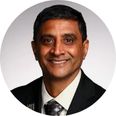LEAD Reverse Mentoring Pair
Yu-Chieh David Chen and Thayumanasamy Somasundaram
 Yu-Chieh David Chen, PhD, Reverse Mentor
Yu-Chieh David Chen, PhD, Reverse Mentor
Yu-Chieh David Chen is a fellow of The Institutes of Health (NIH) F32 and K99 in Claude Desplan's lab at New York University. He was previously a Howard Hughes Medical Institute (HHMI) International Student Research Fellow and completed his graduate studies in Anupama Dahanukar's lab at the University of California, Riverside. Chen's long-term research interest focuses on the developmental processes and functional roles of primary senses—vision, touch, hearing, and chemosensation (taste and smell)—which are critical for organisms to perceive and interact with their environment.
Chen is on the faculty job market and aims to establish his independent research program to explore how the brain creates structured maps to process diverse sensory inputs during development. He plans to use Drosophila visual and gustatory circuits to uncover the molecular regulators involved in key developmental events, such as cell specification, axonal targeting, and synaptic partner matching, to form functional sensory circuits. In addition to his research, Chen is passionate about teaching and mentoring the next generation of scientists. For more information, visit his website at ycdavidchen.com.
What new skills do you seek to gain as a reverse mentor?
As a reverse mentor, I aim to develop my advocacy and leadership skills, particularly in influencing policy changes to support work-life balance for working parents in academia. I also want to enhance my ability to provide constructive feedback to senior-level leaders in a respectful and impactful manner. By participating in this program, I hope to gain a better understanding of the decision-making processes at higher institutional levels and learn how to bridge communication gaps between diverse groups within the academic community.
How is mentoring important to your career development?
Mentoring is crucial to my career development, providing opportunities to learn from diverse experiences, refine my leadership skills, and cultivate professional networks. Through mentoring, I not only receive guidance on navigating academia but also contribute by sharing my perspectives, particularly as an immigrant and a parent in the academic field. This exchange enriches my understanding of supporting and uplifting others in similar circumstances, ultimately shaping my approach as a future faculty member.
How does diversity and inclusivity impact your leadership style?
Diversity and inclusivity are at the core of my leadership approach. Coming from a background that includes multiple roles—as an immigrant, a working parent, and a postdoc—I understand the value of inclusive environments where diverse perspectives can thrive. My leadership style is built on empathy, active listening, and collaboration, ensuring that all voices are heard. I believe fostering an inclusive team enhances creativity and innovation, leading to more effective problem-solving and long-term success in research and academic settings.
Yu-Chieh David Chen is a member of Society for Developmental Biology, a FASEB member society.
 Thayumanasamy Somasundaram, PhD, Reverse Mentee
Thayumanasamy Somasundaram, PhD, Reverse Mentee
Thayumanasamy Somasundaram is a senior research associate and a distinguished university scholar at Florida State University (FSU), Tallahassee, Florida. For the past 30 years, he has been the director of an X-ray crystallography core facility at the Institute of Molecular Biophysics at FSU. Somasundaram is the current president of the Association of Biomolecular Resource Facilities, an organization that promotes excellence in shared resource facilities worldwide, and a member of FASEB. Somasundaram joined the FASEB LEAD program as a reverse mentee in 2023.
What new skills do you seek to gain as a reverse mentee?
One of the skills I want to acquire is the act of listening. I also want to understand the difficulties younger members of my profession face as they climb the career ladder while maintaining a good work-life balance.
How is mentoring important to your career development?
I have spent many years as core facility director. So, I approach every situation in a certain way based on my experience, but I realize it may not be the only way. I believe learning to think differently, especially with different perspectives, will allow me to see a much larger view of work and life. A mentor will give me this opportunity.
How does diversity and inclusivity impact your leadership style?
Fortunately, my place of employment surrounds me with people with different socio-economic backgrounds, educational levels, scientific disciplines, and nationalities. Those experiences have taught me that despite many outward differences and variations, in general, all of us work toward a balanced life, good career opportunities, cooperation, and progress. By being inclusive, you acquire great ideas and find simple solutions that, at times, are beyond the purview of one’s own imagination or experience.
Thayumanasamy Somasundaram is a member of Association of Biomolecular Resource Facilities, a FASEB member society